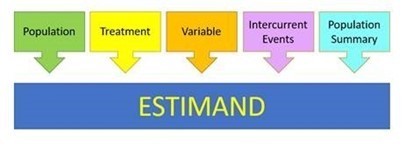
Estimands; Intercurrent Events
Part 2 of our series on Estimands
An intercurrent event is an event of interest, occurring after treatment initiation, which can affect the interpretation of the endpoints in a study, such as a participant taking rescue medication, or a participant prematurely discontinues randomised study treatment. The details below outline the five different strategies included in the ICH E9 Addendum that can be used alone or in combination to handle intercurrent events.
Treatment Policy: Regardless of whether an intercurrent event occurred, value is collected and used in analysis.
This strategy reflects the ITT principle and would not be fitting where intercurrent event is death, as it would not be possible to continue to collect data on participants after the event.
Example: discontinuation or interruption in treatment will be ignored.
Hypothetical: What would the value have been if the intercurrent event had not occurred?
Example: data missing due to study treatment discontinuation imputed using data from similar participants.
Composite variable: Intercurrent event is incorporated into the definition of variable
When an intercurrent event is informative of participant’s outcome, and as such is incorporated into definition of variable.
Example: participants who took rescue medication would be considered as non-responders, regardless of outcome.
While on treatment: Values up until intercurrent event are analysed.
Example: treatment given to those with terminal illness who may benefit from drug, however participants die during the study.
Principal stratum: Population is defined by those in whom the intercurrent event would or would not occur. Note that because intercurrent events are observed after treatment initiation, this strategy is not protected by randomisation.
Example: some participants do not tolerate drug well, but treatment effect of those who did tolerate treatment is of interest.
If you are interested in hearing more about Estimands or other statistical topics please contact us, as we have a very experienced team of statisticians who can help!